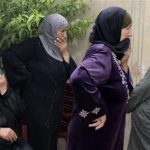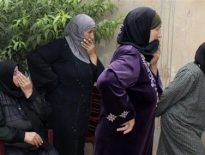(Reuters) – One of President Bashar al-Assad’s personal friends has defected and was headed for exile in France on Friday, as the Syrian crisis took on a Cold War tone when Washington threatened to make Russia and China “pay” for backing the government in Damascus.

Manaf Tlas, a cadet college classmate, Republican Guard general and son of Assad’s father’s defense chief, has yet to surface abroad, or clearly to throw his lot in with the rebels, who acknowledged the loss of one of their strongholds overnight.
But his desertion, leaked by family friends, was confirmed by the French government. That gave a boost to a conference it hosted in Paris at which Western powers and Sunni Arab rulers, bitterly opposed to Assad’s Iranian-sponsored administration, agreed to “massively increase” aid to the Syrian opposition.
The departure of Tlas, a glamorous, 40-something fixture of both Damascus society and Assad’s praetorian close protection force, may have limited practical impact. But it offers succour to an opposition that is divided and poorly armed, as well as to foreign backers whose assurances of flagging morale in Assad’s inner circle had begun to wear thin after 16 months of conflict.
“If people like him, and like the generals and colonels and others who have recently defected to Turkey are any indication, regime insiders and the military establishment are starting to vote with their feet,” U.S. Secretary of State Hillary Clinton said in Paris after a speech lambasting Moscow and Beijing in unusually strong terms for blocking U.N. action against Assad.
“The only way that will change is if every nation represented here directly and urgently makes it clear that Russia and China will pay a price because they are holding up progress, blockading it,” she told the 50 or so delegations.
However, as the past year has shown, options for Assad’s foes to pressure his defenders remain limited, given the economic and political strength of both Russia and China.
Moscow, an ally since the Cold War days of Assad’s father, has supported a new proposal by U.N. envoy Kofi Annan for a transitional, national unity government in Damascus. But, like China, Moscow is wary of what it sees as a growing Western taste for “regime change”, and opposes forcing Assad to step down.
In response to Clinton’s remarks, Deputy Foreign Minister Gennady Gatilov said she was contradicting the common strategy the divided world powers managed to agree at Geneva last week.
Such deadlock in global diplomacy has left the Western powers trying to give an impression of momentum growing against Assad, holding a series of meetings and, as seen on Friday, trumpeting defections and piling psychological pressure on other members of the ruling elite to think about jumping ship.
As Clinton declared in Paris: “Let me say to the soldiers and officials still supporting the Assad regime – the Syrian people will remember the choices you make in the coming days.
“It is time to abandon the dictator, embrace your countrymen and women, and get on the right side of history.”
SECTARIAN STRAINS
As rare faces from Syria’s Sunni Muslim majority within a ruling clique dominated by Assad’s fellow Alawites, Tlas and his father Mustapha, who friends said left for Paris some months ago claiming medical problems, long furnished an answer to Syrians who complained of sectarian domination by Alawites. Their flight may show Assad is losing wider support among wealthier Sunnis.
It also suggests the Tlas clan, whatever moral scruples friends say were their prime motive for abandoning their friend and patron, has seen the writing on the wall for Assad’s rule.
Opposition sources said Manaf Tlas had seen his movements watched as suspicion of him increased before he fled and that other potential defectors, being courted assiduously by the opposition, were also under surveillance. Security men ransacked Tlas’s house on Thursday, an activist in Damascus said.
Abdel Baset Seda, the president of the opposition Syrian National Council, told a news conference in Paris that he was in contact with “several” high-ranking officials still inside the country and also hoped to speak with Tlas in the coming days.
“This shows that the very heart of the regime is starting to crumble. This is reminiscent of what happened in Libya toward the end, when there were defections every day,” he said, recalling the fall of Muammar Gaddafi last August.
However, a Syrian news website quoted a Syrian official on Thursday as saying dismissively: “His desertion means nothing. If Syrian intelligence had wanted to arrest him it would have.”
Bloodshed on the ground and the suffering of thousands of civilians forced to flee homes and worry about food shortages have kept up pressure on Western governments to be seen to be doing something and the “Friends of the Syrian People” meeting in Paris saw new calls for U.N. action and backing for rebels.
But the opposition remains fractious. A meeting in Cairo this week saw a fistfight; governments are wary of anti-Western Sunni Islamists in rebel ranks and are reluctant to see them too heavily armed; and the Western powers have little appetite for a Libyan-style military intervention of their own in a pivotal regional state that is home to a volatile mix of communities.
Yet the veto power which Moscow and Beijing wield in the United Nations Security Council has also blocked Western efforts to tighten the net of sanctions around Assad, leaving leaders watching impatiently for signs of cracks from within – something fearful Alawites and other minorities seem anxious to prevent.
REBEL TOWN FALLS
Catherine Ashton, the European Union’s foreign affairs chief, spoke again with alarm at the situation on the ground: “The risk of full civil war has become even more real,” she said. “The regime is clearly responsible for the brutality of the repression. Instead of freeing detainees and withdrawing its troops and heavy weapons from urban areas, Assad’s regime continues with the shelling of innocent civilians.”
Syria’s army took control of the rebel stronghold of Khan Sheikhoun in northern Idlib province on Friday after an assault on the town backed by helicopters, rebels said.
“The Free Army withdrew from the town last night after it ran out of ammunition. Assad’s army is in control,” said Abu Hamam, a rebel spokesman who fled to a nearby village.
“They are burning the houses. They have burned my own house. I see the smoke covering the sky from where I am now.”
Army shelling and assaults also killed three people in the southern province of Deraa, where the nationwide revolt began.
Opposition activists say more than 15,000 people have been killed in the uprising, while the government says several thousand members of the security forces have died.
Clinton repeated a U.S. and French call for a U.N. Security Council resolution under Chapter 7 of the U.N. Charter, which allows the Council to authorize actions ranging from diplomatic and economic sanctions to military intervention.
Russia and China and say they are committed rather to the peace plan drafted by Annan which proposes national dialogue. However, that plan’s prospects seem dim; U.N. peace monitors effectively gave up on their mission last month after just weeks in Syria as it became clear there was no peace to monitor.
Annan said he was pushing for negotiation and urging the rebels to cooperate. Telling Britain’s Guardian newspaper the alternative was more war, he said: “We are trying to implement some of the decisions taken in Geneva, most importantly exploring on the ground the most effective way to stop the violence and get them thinking of the political process.”
Thousands of families have fled their homes in the past two weeks due to heavy fighting between government forces and rebels and many face food shortages, the United Nations said on Friday.
Late on Friday, about 300 refugees, including about 30 military personnel, crossed into Turkey at the border at Bukulmez in Hatay province, according to a Reuters cameraman. They were picked up by 20 minibuses.
(Writing by Alastair Macdonald; Editing by Giles Elgood and Michael Roddy)





